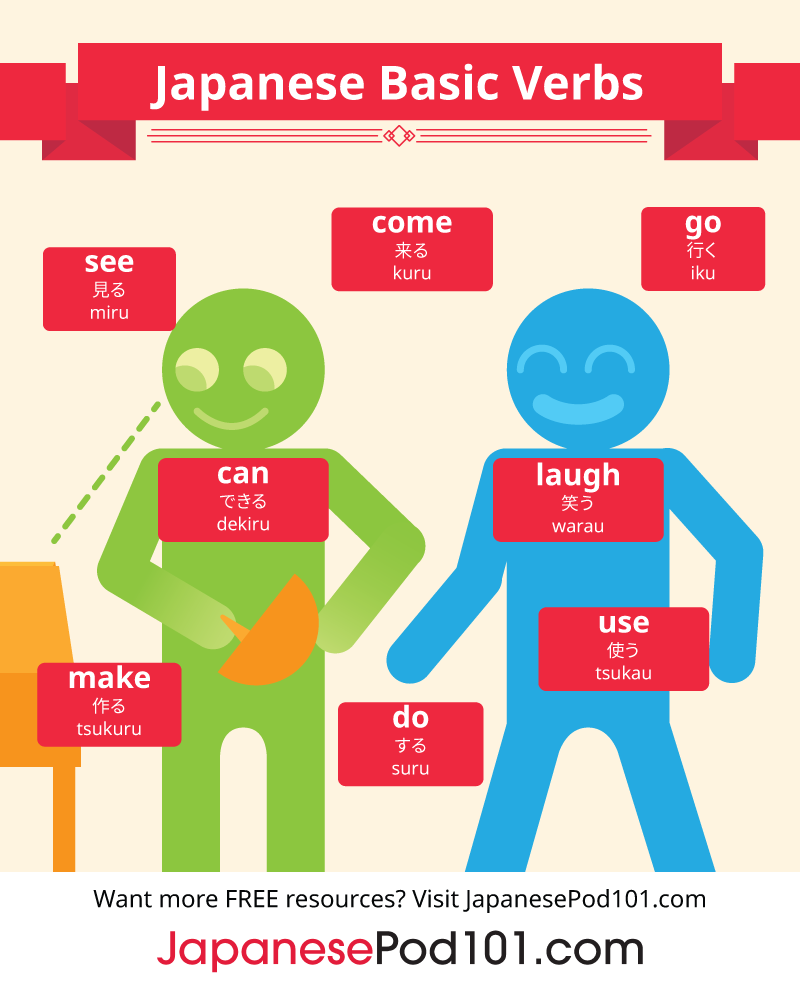
How many Japanese verbs do you know? When you know the 100 most common Japanese verbs and understand basic Japanese verb conjugation, you can express and understand Japanese much better!
Verbs are one of the most important parts of speech, and it’s said that verbs are the second most frequently used words (26%, next to nouns at 42%) among all other categories of words in daily Japanese conversations.
It’s always a bit tiring to learn grammatical rules, such as the conjugation patterns of verbs. However, it’s easier than you think! Once you have the rules down and become used to using them, all you have to do is apply those rules to new Japanese verbs you learn.
Japanese verb conjugation has unique rules from those in English. But don’t worry! Some features are simpler—there’s no verb conjugation based on the speaker, such as singular vs. plural, gender, or the category of that person grammatically, called 人称 (ninshō). This means that in English, verbs change based on who’s speaking:
- I am
- She is
- You are
- I go
- He goes
However, Japanese verbs remain the same regardless of who the speaker is.
In this article, we’ll introduce the top 100 Japanese verbs for beginners, which are most frequently used. We’ll also give you some tips about Japanese verb conjugation, though we’ll have a more in-depth article on this topic later on. Let’s master Japanese verbs here at JapanesePod101!
 Table of Contents
Table of Contents
- Verb Groups: Different Types of Japanese Verbs
- Action Verbs: Physical
- Action Verbs: Mental
- Other Verbs
- Japanese Auxiliary Verbs: 助動詞 (Jodōshi)
- Verb Usage: How Japanese Verbs Work
- Conclusion: How JapanesePod101 Can Help You Learn More Japanese
1. Verb Groups: Different Types of Japanese Verbs

Japanese verbs always end with u or ru, and verbs are categorized into three groups:
- Class 1: U-verb
- Class 2: Ru-verb
- Class 3: Irregular verb
As the conjugation system itself is very simple, memorizing the patterns and rules will help you learn how to use Japanese verbs properly.
Japanese verbs consist of two parts: a verb base (“stem”) and a suffix. A stem doesn’t change, and a suffix conjugates according to the forms. These forms include casual vs. polite and plain vs. negative.
Class 1: U-Verbs
| 書く (kaku):write | Casual | Polite |
| Stem | kak | |
| Basic Form | 書-く kak-u | 書-きます kak-imasu |
| Negative Form | 書-かない kak-anai | 書-きません kak-imasen |
The verb 書く (kaku), meaning “write,” has the stem kak and the suffix u. As you can see from the Japanese verbs chart above, the suffix conjugates and changes according to the forms.
However, you have to keep in mind that if a verb ends with u, it means that the last vowel is u. Therefore, u-verbs can end with Hiragana:
- う(u)
- く (ku)
- す(su)
- つ (tsu)
- ぬ (nu)
- む (mu)
- る (ru)

U-verb Examples
| English | Reading | Kanji | Hiragana |
|---|---|---|---|
| meet | au | 会う | あう |
| learn | manabu | 学ぶ | まなぶ |
| push | osu | 押す | おす |
| pull | hiku | 引く | ひく |
Class 2: Ru-Verbs
| 出る (deru) :come out | Casual | Polite |
| Stem | de | |
| Basic Form | 出-る de-ru | 出-ます de-masu |
| Negative Form | 出-ない de-nai | 出-ません de-masen |
The verb 出る (deru), meaning “come out,” has the stem de and the suffix ru. The suffix conjugates and changes as it did above. It’s similar to u-verbs, but slightly different.
Ru-verb Examples
| English | Reading | Kanji | Hiragana |
|---|---|---|---|
| teach | oshieru | 教える | おしえる |
| exist (living things) | iru | いる | いる |
| sleep | neru | 寝る | ねる |
| answer | kotaeru | 答える | こたえる |
Class 3: Irregular Verbs
Don’t worry too much! There are only two Japanese irregular verbs.
The stems of the verbs change according to the conjugating forms. There are only two verbs, so let’s memorize them!
- 来る (kuru):come
| 来る (kuru) :come | Casual | Polite |
| Stem | ku / ko / ki | |
| Basic Form | 来-る く-る ku-ru | 来-ます き-ます ki-masu |
| Negative Form | 来-ない こ-ない ko-nai | 来-ません き-ません ki-masen |
- する (suru):do
| する (suru) :do | Casual | Polite |
| Stem | su / shi | |
| Basic Form | す-る su-ru | し-ます shi-masu |
| Negative Form | し-ない shi-nai | し-ません shi-masen |
The Japanese verb する (suru), meaning “do,” is a very handy word which can often turn a noun into a verb when it’s added next to the noun.
For example:
- 勉強 (benkyō) + する (suru) = to study
studying (do)
- 参加 (sanka) + する (suru) = to participate
participation (do)
- 感謝 (kansha) + する (suru) = to thank/appreciate
appreciation/gratitude (do)
Now that you have a better idea of how to conjugate different types of verbs, let’s move on to our Japanese verbs list!

2. Action Verbs: Physical
To start, here are the most common Japanese verbs of motion.
| English | Japanese Reading | Kanji | Hiragana |
|---|---|---|---|
| see / look / watch | miru | 見る | みる |
| hear / listen | kiku | 聞く | きく |
| say | iu | 言う | いう |
| walk | aruku | 歩く | あるく |
| run | hashiru | 走る | はしる |
| eat | taberu | 食べる | たべる |
| drink | nomu | 飲む | のむ |
| take | toru | 取る | とる |
| use | tsukau | 使う | つかう |
| move | ugoku | 動く | うごく |
| hold / grab | tsukamu | 掴む | つかむ |
| sit | suwaru | 座る | すわる |
| stand | tatsu | 立つ | たつ |
| wear | kiru | 着る | きる |
| take off (clothes/shoes) | nugu | 脱ぐ | ぬぐ |
| work | hataraku | 働く | はたらく |
| wake up | okiru | 起きる | おきる |
| go | iku | 行く | いく |
| come | kuru | 来る | くる |
| bend | mageru | 曲げる | まげる |
| search | sagasu | 探す | さがす |
| read | yomu | 読む | よむ |
| play | asobu | 遊ぶ | あそぶ |
| get on (vehicle) | noru | 乗る | のる |
| get off (vehicle) | oriru | 降りる | おりる |
| start | hajimeru | 始める | はじめる |
| finish | oeru | 終える | おえる |
| open | akeru | 開ける | あける |
| close | shimeru | 閉める | しめる |
| stop | tomeru | 止める | とめる |
| put | oku | 置く | おく |
| wait | matsu | 待つ | まつ |
| rest | yasumu | 休む | やすむ |
| learn | manabu | 学ぶ | まなぶ |
| give | ataeru | 与える | あたえる |
| visit | otozureru | 訪れる | おとずれる |
| leave | saru | 去る | さる |
| depart | shuppatsu suru | 出発する | しゅっぱつする |
| arrive | tōchaku suru | 到着する | とうちゃくする |
| sell | uru | 売る | うる |
| buy | kau | 買う | かう |
| live | ikiru | 生きる | いきる |
| die | shinu | 死ぬ | しぬ |

3. Action Verbs: Mental
These everyday Japanese verbs are essential for expressing actions that aren’t physical or immediately tangible. Take a look!
| know | Japanese Reading | Kanji | Hiragana |
|---|---|---|---|
| know | shiru | 知る | しる |
| think | kangaeru | 考える | かんがえる |
| imagine | sōzō suru | 想像する | そうぞうする |
| feel | kanjiru | 感じる | かんじる |
| like | konomu | 好む | このむ |
| dislike | kirau | 嫌う | きらう |
| love | aisuru | 愛する | あいする |
| hate | nikumu | 憎む | にくむ |
| believe | shinjiru | 信じる | しんじる |
| expect | kitai suru | 期待する | きたいする |
| understand | rikai suru | 理解する | りかいする |
| remember | omoidasu | 思い出す | おもいだす |
| agree | dōi suru | 同意する | どういする |
| laugh | warau | 笑う | わらう |
| cry | naku | 泣く | なく |
| get angry | okoru | 怒る | おこる |
| feel sad | kanashimu | 悲しむ | かなしむ |
| wish / hope | negau | 願う | ねがう |
| get surprised | odoroku | 驚く | おどろく |
| forget | wasureru | 忘れる | わすれる |
| satisfy | manzoku suru | 満足する | まんぞくする |
| doubt | utagau | 疑う | うたがう |
| decide | kimeru | 決める | きめる |
| notice | kizuku | 気づく | きづく |
To check your pronunciation of Japanese verbs with audio, see our page about the 25 Most Commonly Used Verbs.
4. Other Verbs

You’re almost done! There are just a few more Japanese language verbs you should know.
| English | Japanese Reading | Kanji | Hiragana |
|---|---|---|---|
| appear | arawareru | 現れる | あらわれる |
| remain | kieru | 消える | きえる |
| remain | nokoru | 残る | のこる |
| return | kaeru | 帰る | かえる |
| check | kakunin suru | 確認する | かくにんする |
| increase | fueru | 増える | ふえる |
| decrease | heru | 減る | へる |
| carry | hakobu | 運ぶ | はこぶ |
| get dry | kawaku | 乾く | かわく |
| get wet | nureru | 濡れる | ぬれる |
| wash | arau | 洗う | あらう |
| get dirty | yogoreru | 汚れる | よごれる |
| indicate | shimesu | 示す | しめす |
| enjoy | tanoshimu | 楽しむ | たのしむ |
| fall | ochiru | 落ちる | おちる |
| win | katsu | 勝つ | かつ |
| lose | makeru | 負ける | まける |
| break | kowasu | 壊す | こわす |
| fix | naosu | 直す | なおす |
| cross | wataru | 渡る | わたる |
| change | kawaru | 変わる | かわる |
| send | okuru | 送る | おくる |
| receive | uketoru | 受け取る | うけとる |

5. Japanese Auxiliary Verbs: 助動詞 (Jodōshi)
The Japanese 助動詞 (Jodōshi), which translates as “auxiliary verb,” is a functional type of word with some variations. By adding an auxiliary verb, the meaning of the preceding word will be modified.
For example:
- 感じる (kanjiru) : “feel” + させる (saseru) [causative verb]
= 感じさせる (kanjisaseru) : “make (you) feel”
- 食べる (taberu) : “eat” + られる (rareru) [ability]
= 食べられる (taberareru) : edible
Here are some of the Japanese auxiliary verbs:
| Japanese Reading | Hiragana | Usage / Meaning / Example |
|---|---|---|
| (sa)seru | (ら)れる | Causation 食べさせる tabesaseru to make (one) eat |
| (ra) reru | (ら)れる | Passive / Ability, etc. 食べられる taberareru edible / being eaten |
| nai / nu / n | (よ)う | Negation 食べない tabenai (I do) not eat |
| yō | (よ)う | Volition 食べよう tabeyō I will eat / Let’s eat |
| tai / tagaru | たい / たがる | Desire 食べたい tabetai I want to eat |
| yō da | ようだ | Similarity 食べるようだ taberu yō da it looks like (she/he) eats |
| sō da | そうだ | Hearsay 食べるそうだ taberu sō da they say that (she/he) eats |
| rashii | らしい | Hearsay / Behavior 食べるらしい taberu rashii they say that (she/he) may eat |
| da / desu・masu | だ / です・ます | Predication / Politeness (copula) 食べます tabemasu (I) eat |

6. Verb Usage: How Japanese Verbs Work
Japanese language verb conjugation patterns differ for u-verbs, ru-verbs, and irregular verbs.
Because many frequently used Japanese words are in this category, let’s take a look at an example for u-verbs.
The conjugation pattern for the verb 書く (kaku), meaning “write,” is as follows:
| Conjugation | Kanji | Usage / Meaning |
|---|---|---|
| kakAnai | 書かない | Negative Form |
| kakImasu | 書きます | Polite Form |
| kaIta | 書いた | Ta- Form |
| kakU | 書く | Dictionary Form |
| kakU toki | 書くとき | Attributive Form |
| kakEba | 書けば | Conditional Form |
| kakE | 書け | Imperative Form |
| kakO | 書こう | Suggestion Form (“Let’s-“) |
For more detail on the grammar of Japanese verbs and other conjugation patterns, please visit Verb Conjugation.
We also have other articles you may like to check out: Top 100 Japanese Adjectives, Top 100 Japanese Nouns, and Japanese Pronouns.
7. Conclusion: How JapanesePod101 Can Help You Learn More Japanese

In this article, we introduced the most common Japanese verbs and explained the basics of Japanese verb conjugation. Once you know the conjugation patterns, you’ll be able to more quickly expand your Japanese verbs vocabulary and take better command of the language.
If you would like to learn more about the Japanese language and other useful Japanese phrases for a variety of situations, you’ll find a lot of helpful content on JapanesePod101.com. We provide an array of free lessons for you to improve your Japanese language skills. To get you started, here’s some more information on Japanese basics with audio:
To learn how to converse with others in Japanese, check out Top 15 Questions You Should Know for Conversations and Top 10 Conversational Phrases. If you want to learn Japanese kanji, you’ll also enjoy Basic Kanji for Verbs and Basic Kanji for Adjectives.
And there’s so much more! Learn faster and enjoy studying Japanese at JapanesePod101.com!
Before you go, let us know in the comments if there are any Japanese verbs you still want to know! We’d be glad to help, and look forward to hearing from you!










